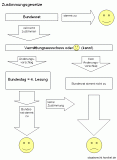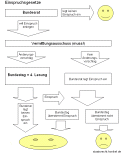Inhalt:
Das Hauptverfahren
Verfahren im Bundestag
Die Bundesgesetze werden vom Bundestag beschlossen (Artikel 77 I S 1 GG). Vor der Abstimmung über den Gesetzesentwurf finden drei Lesungen (= Beratungen im Plenum) statt.
Nachdem der Gesetzesentwurf dem Bundestag zugeleitet wurde, wird er an jeden Abgeordneten verteilt. Der Entwurf wird nun zunächst in den Fraktionen vorberaten, im Ältestenrat wird entschieden, wann die erste Lesung stattfinden soll.
In der ersten Lesung werden die Grundsätze der Gesetzesvorlage besprochen.
Danach wird die Vorlage an den jeweils fachlich zuständigen Ausschuss weitergeleitet. Falls mehrere Ausschüsse zuständig sind, wird einer zum federführenden Ausschuss bestimmt (§ 63 GOBT). Im jeweiligen Ausschuss wird der Gesetzesentwurf ausgiebig beraten, gegebenenfalls geändert und angepasst. Oft finden auch Anhörungen sachkundiger Bürger statt.
In der zweiten Lesung findet basierend auf den Ergebnissen der Ausschusssitzungen eine detaillierte Einzelberatung der verschiedenen Bestimmungen der Gesetzesvorlage statt. Änderungsanträge können von jedem Abgeordneten gestellt werden. Über alle Anträge wird jeweils abgestimmt.
Nachdem eventuelle Änderungen aus der zweiten Lesung in den Gesetzesentwurf eingearbeitet worden sind, kann die dritte Lesung stattfinden. Falls keine Änderungen vorgenommen wurden, kann die dritte Lesung unmittelbar nach der zweiten Lesung folgen. Die dritte Lesung umfasst wiederum Grundsatzerklärungen der Fraktionen. Eine Einzelberatung findet nur zu Änderungsanträgen statt.
Nun wird über die Annahme des Gesetzesentwurfs abgestimmt. In der Regel genügt dabei die einfache Mehrheit (Mehrheit der abgegebenen Stimmen, Artikel 42 II GG). Bei Gesetzen die das Grundgesetz ändern, ist eine Mehrheit von 2/3 der gesetzlichen Mitglieder des Bundestags notwendig (Artikel 79 II GG).
Nach der Annahme des Gesetzes im Bundestag wird es an den Bundesrat weiter geleitet (Artikel 77 I S 2 GG).
Artikel 77 I
Die Bundesgesetze werden vom Bundestage beschlossen. Sie sind nach ihrer Annahme durch den Präsidenten des Bundestages unverzüglich dem Bundesrate zuzuleiten.
Da bei der Bundesgesetzgebung, im Gegensatz zum Beispiel zur Gesetzgebung in Baden-Württemberg, zwei getrennte Organe beteiligt sind - Bundestag und Bundesrat - spricht man auch von einem Zweikammersystem.
Verfahren im Bundesrat / Vermittlungsausschuss
Die Art der Mitwirkung von Bundesrat und Vermittlungsausschuss im Gesetzgebungsverfahren hängt davon ab, ob es sich bei dem im Bundestag beschlossenen Gesetz um ein Zustimmungs- oder um ein Einspruchsgesetz handelt. Wird hier das falsche Verfahren gewählt, ist das Gesetz formell rechtswidrig.
Zustimmungsgesetze
Bei Zustimmungsgesetzen (Gesetze, bei denen die ausdrückliche Zustimmung des Bundesrats vorgesehen ist, zum Beispiel bei grundgesetzändernden Gesetzen, Artikel 79 I, II GG, oder bei vielen Gesetzen die Länderinteressen berühren) kann der Bundesrat zustimmen und damit die Voraussetzung für die Ausfertigung des Gesetzes schaffen (Artikel 78 GG).
Oder er kann die Zustimmung verweigern und dadurch das Gesetz scheitern lassen.
Wenn der Bundesrat die Zustimmung verweigern will, so kann er innerhalb von drei Wochen nach Eingang des Gesetzesbeschlusses den Vermittlungsausschuss anrufen.
Die Anrufung des Vermittlungsausschusses kann bei Zustimmungsgesetzen auch durch den Bundestag oder die Bundesregierung erfolgen (Artikel 77 II GG).
Artikel 77 IIa
Soweit zu einem Gesetz die Zustimmung des Bundesrates erforderlich ist, hat der Bundesrat, wenn ein Verlangen nach Absatz 2 Satz 1 nicht gestellt oder das Vermittlungsverfahren ohne einen Vorschlag zur Änderung des Gesetzesbeschlusses beendet ist, in angemessener Frist über die Zustimmung Beschluß zu fassen.
Vermittlungsausschuss
Der Vermittlungsausschuss ist ein gemeinsames Gremium von Bundestag und Bundesrat zur Beratung und Klärung von Meinungsunterschieden im Gesetzgebungsverfahren. Der Vermittlungsausschuss erarbeitet gegebenenfalls Änderungsvorschläge zu dem vom Bundestag beschlossenen Gesetz, so dass das Gesetz für beide Seiten akzeptabel werden kann.
Er besteht aus jeweils 16 Mitgliedern von Bundestag und Bundesrat. Die Mitglieder des Bundesrates sind im Vermittlungsausschuss ausnahmsweise nicht weisungsgebunden.
Wenn der Vermittlungsausschuss keine Änderung vorschlägt, wird der Gesetzesbeschluss an den Bundesrat zur Erteilung oder Verweigerung der Zustimmung gegeben.
Schlägt der Vermittlungsausschuss aber Änderungen beziehungsweise die Aufhebung des Gesetzesvorschlags vor, dann wird das Gesetz an den Bundestag zur erneuten Beschlussfassung zurückgegeben („4. Lesung”). Der Bundestag hebt den Gesetzesvorschlag entweder auf, stimmt den Änderungsvorschlägen zu oder lehnt sie ab.
In der nun vom Bundestag beschlossenen Form geht das Gesetz, falls es nicht aufgehoben wurde, an den Bundesrat zur endgültigen Entscheidung. Nur mit ausdrücklicher Zustimmung des Bundesrates kann ein Zustimmungsgesetz in Kraft treten.
Artikel 77 II
Der Bundesrat kann binnen drei Wochen nach Eingang des Gesetzesbeschlusses verlangen, dass ein aus Mitgliedern des Bundestages und des Bundesrates für die gemeinsame Beratung von Vorlagen gebildeter Ausschuß einberufen wird. Die Zusammensetzung und das Verfahren dieses Ausschusses regelt eine Geschäftsordnung, die vom Bundestag beschlossen wird und der Zustimmung des Bundesrates bedarf. Die in diesen Ausschuß entsandten Mitglieder des Bundesrates sind nicht an Weisungen gebunden. Ist zu einem Gesetze die Zustimmung des Bundesrates erforderlich, so können auch der Bundestag und die Bundesregierung die Einberufung verlangen. Schlägt der Ausschuß eine Änderung des Gesetzesbeschlusses vor, so hat der Bundestag erneut Beschluß zu fassen.
Einspruchsgesetze (einfache Gesetze)
Bei allen übrigen Gesetzen ist keine ausdrückliche Zustimmung des Bundesrates notwendig. Der Bundesrat kann aber gegen den Gesetzesbeschluss des Bundestages Einspruch erheben (Artikel 77 III GG „aufschiebendes Veto”). Dieser Einspruch des Bundesrates kann aber unter Umständen vom Bundestag zurückgewiesen werden.
Wenn der Bundesrat bei einem Einspruchsgesetz Einspruch erheben will, muss er zunächst den Vermittlungsausschuss anrufen. Das Vermittlungsverfahren selbst unterscheidet sich nicht von dem bei Zustimmungsgesetzen.
Erhebt der Bundesrat nach Abschluss des Vermittlungsverfahrens Einspruch, kann der Bundestag versuchen, diesen Einspruch zurückzuweisen.
Dazu ist die „gleiche” Mehrheit wie beim Erheben des Einspruchs erforderlich (Artikel 77 IV GG): Wenn der Einspruch mit absoluter Mehrheit erhoben wurde, ist auch eine absolute Mehrheit zum Zurückweisen erforderlich. Wenn der Einspruch mit absoluter 2/3-Mehrheit erhoben wurde, ist eine einfache 2/3-Mehrheit erforderlich, die aber gleichzeitig mindestens eine absolute Mehrheit sein muss („doppelt qualifizierte Mehrheit”).
Artikel 77 III
Soweit zu einem Gesetze die Zustimmung des Bundesrates nicht erforderlich ist, kann der Bundesrat, wenn das Verfahren nach Absatz 2 beendigt ist, gegen ein vom Bundestage beschlossenes Gesetz binnen zwei Wochen Einspruch einlegen. Die Einspruchsfrist beginnt im Falle des Absatzes 2 letzter Satz mit dem Eingange des vom Bundestage erneut gefaßten Beschlusses, in allen anderen Fällen mit dem Eingange der Mitteilung des Vorsitzenden des in Absatz 2 vorgesehenen Ausschusses, dass das Verfahren vor dem Ausschusse abgeschlossen ist.
Wenn der Einspruch vom Bundestag zurückgewiesen werden konnte, kann das Gesetz ausgefertigt und verkündet werden. Wenn der Einspruch des Bundesrates nicht zurückgewiesen werden konnte, ist das Gesetz gescheitert.
Ausfertigung und Verkündung
Das beschlossene Gesetz wird von der Bundesregierung (von der Bundeskanzlerin beziehungsweise vom Bundeskanzler oder vom fachlich zuständigem Minister) unterschrieben (Gegenzeichnung) und danach vom Bundespräsidenten ausgefertigt.
Er fertigt die Gesetze aus (Artikel 82 I S 1 GG), indem er die Originalurkunde datiert und unterzeichnet und anschließend das neue Gesetz im Bundesgesetzblatt verkündet. Bei der Ausfertigung prüft der Bundespräsident das Gesetz auf formelle und materielle Rechtmäßigkeit. Dieses Prüfungsrecht ist im materiellen Bereich allerdings auf offensichtliche Fehler beschränkt (Evidenzkontrolle).
Er hat kein sachliches oder politisches Prüfungsrecht (Artikel 82 I S 1 GG) und darf aus persönlichen Gründen die Ausfertigung nicht verweigern.
Artikel 82 I
Die nach den Vorschriften dieses Grundgesetzes zustande gekommenen Gesetze werden vom Bundespräsidenten nach Gegenzeichnung ausgefertigt und im Bundesgesetzblatte verkündet. Rechtsverordnungen werden von der Stelle, die sie erläßt, ausgefertigt und vorbehaltlich anderweitiger gesetzlicher Regelung im Bundesgesetzblatte verkündet.
Vollzogen werden die Gesetze von der öffentlichen Verwaltung.
Änderungen bestehender Gesetze (Gesetzesänderungen) werden auch nach dem beschriebenen Verfahren durchgeführt.
Gesetzgebungsnotstand (Artikel 81 GG)
Der Gesetzgebungsnotstand ist ein verkürztes Gesetzgebungsverfahren für den Fall, dass eine Bundesregierung keine Mehrheit im Bundestag mehr hat.
Wenn ein Bundeskanzler, der an der Vertrauensfrage (Artikel 68 GG) gescheitert ist, trotzdem im Amt bleibt und der Bundestag nicht aufgelöst wird, dann kann der Bundespräsident, mit Zustimmung des Bundesrates, aufgrund einer von der Bundesregierung als dringlich bezeichneten Gesetzesvorlage den Gesetzgebungsnotstand erklären (Artikel 81 I GG).
Lehnt der Bundestag nach Erklärung des Gesetzgebungsnotstands die Gesetzesvorlage wieder ab, so gilt dieses Gesetz als zustande gekommen, wenn der Bundesrat ihm zustimmt. Ein Gesetzgebungsnotstand, der dann für 6 Monate gilt, ist während der Amtszeit des gleichen Bundeskanzlers nur einmal zulässig.
Durch ein im Rahmen des Gesetzgebungsnotstands zustande gekommenes Gesetz darf das Grundgesetz nicht geändert oder aufgehoben werden.
Artikel 81 I
Wird im Falle des Artikels 68 der Bundestag nicht aufgelöst, so kann der Bundespräsident auf Antrag der Bundesregierung mit Zustimmung des Bundesrates für eine Gesetzesvorlage den Gesetzgebungsnotstand erklären, wenn der Bundestag sie ablehnt, obwohl die Bundesregierung sie als dringlich bezeichnet hat. Das gleiche gilt, wenn eine Gesetzesvorlage abgelehnt worden ist, obwohl der Bundeskanzler mit ihr den Antrag des Artikels 68 verbunden hatte.
Rechtsverordnungen
Der Gesetzgebungsprozess ist ein langwieriges, kompliziertes Verfahren. Um die Legislative dabei zu entlasten („Gesetzesflut”) und um schnell auf wechselnde Anforderungen reagieren zu können, gibt es als Ergänzung zu Gesetzen Rechtsverordnungen. Das sind materielle Gesetze, die von der Exekutive, nach Ermächtigung durch die Legislative, erlassen werden.
Nach Art 80 GG gibt die Legislative vor, in welchem Rahmen und in welchem Umfang Rechtsverordnungen erlassen werden dürfen (Inhalt, Zweck und Ausmaß = Bestimmtheitsgrundsatz).
In keinem Fall dürfen Rechtsverordnungen Gesetze ändern oder gleichberechtigt ergänzen. Außerdem müssen die wesentlichen, grundlegenden Regelungen von der Legislative durch Gesetze vorgenommen werden (Wesentlichkeitstheorie).
Rechtsverordnungen stehen im Rang unter den formellen Gesetzen (Normenpyramide).
Artikel 80 I
Durch Gesetz können die Bundesregierung, ein Bundesminister oder die Landesregierungen ermächtigt werden, Rechtsverordnungen zu erlassen. Dabei müssen Inhalt, Zweck und Ausmaß der erteilten Ermächtigung im Gesetze bestimmt werden. Die Rechtsgrundlage ist in der Verordnung anzugeben. Ist durch Gesetz vorgesehen, dass eine Ermächtigung weiter übertragen werden kann, so bedarf es zur Übertragung der Ermächtigung einer Rechtsverordnung.

